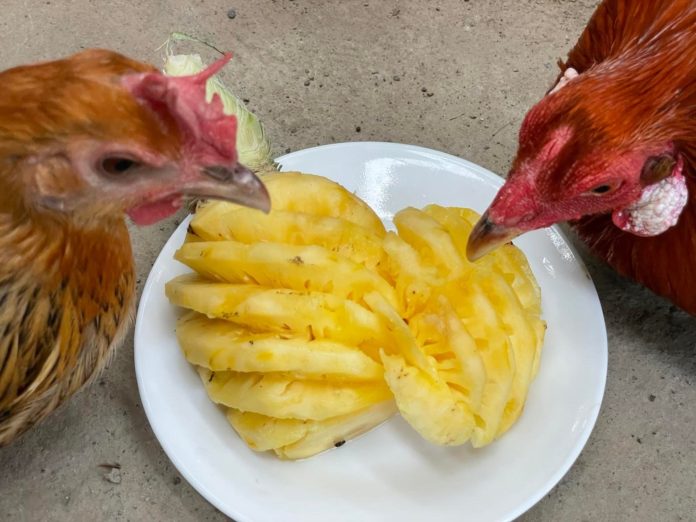Last Updated on January 22, 2024 by Fumipets
Exploring the Feathery Palates: Can Chickens Eat Pineapple?
As backyard chicken enthusiasts seek to provide a well-rounded and nutritious diet for their feathered companions, questions often arise about incorporating various fruits into their feed. One such curiosity that emerges is whether chickens can indulge in the tropical sweetness of pineapple.
In this exploration, we delve into the realm of poultry nutrition to answer the question: Can chickens eat pineapple? Furthermore, we address specific queries to shed light on the potential benefits and considerations of introducing this tropical treat to your flock.
Can Chickens Eat Pineapple?
Chickens should mainly be fed a nutritionally balanced commercial poultry feed for maximum health and development. Additionally, many chicken caretakers like giving their flocks leftover human food as gifts. In addition to giving the hens a diverse diet, this also helps to reduce food waste.
To ensure that the food being supplied is safe for hens to consume, however. Pineapple is a sweet and delicious fruit, but can chickens eat pineapple? Yes, pineapple may be fed to hens without harm, but only in moderation and with a few safeguards that are covered below.
Why Is Eating Pineapple Good for Chickens?
In addition to providing diversity in the food of hens, pineapple provides a number of nutrients that may enhance their health. Additionally low in cholesterol and saturated fat is pineapple. This is significant because, like people, hens should avoid high-fat diets to maintain a healthy weight.
A great source of vitamin C is pineapples. The immune system of the chicken may be strengthened by vitamin C. Chickens that are in good health can manufacture vitamin C on their own. However, if hens are sick or otherwise stressed, they may benefit from extra Vitamin C.
Bromelain is an enzyme found in pineapples in large amounts and aids in digestion. The anti-inflammatory, anti-cancer, and anti-clotting effects of bromelain are also widely documented.
Eating pineapple consistently may help hens improve their digestion, guard against acquiring worms, and fight arthritis since it includes these and other nutrients.

Precautions to Take When Feeding Pineapple to Chickens
As previously mentioned, pineapple may be a tasty and healthful treat for hens. When feeding this fruit, there are a few safety measures to remember.
Chickens shouldn’t be overfed pineapple; it should only be given in moderation. Pineapple’s high sugar content is one explanation for this. Overeating sugar may lead to hens gaining weight and having negative effects on their general health.
As was already mentioned, a chicken’s digestion may be helped by modest doses of pineapple. Overfeeding pineapple, however, can have the opposite effect. Pineapple should never be fed to hens that have digestive issues. Even while the chicken can digest some pineapple, ingesting too much might cause a bezoar, or an accumulation of undigested material. Bezoars may cause major medical problems.
Even while bromelain is healthy in moderation, consuming too much of it might have negative effects. In excess, bromelain may upset hens’ stomachs and lead to skin rashes.
The secret to feeding pineapple to hens safely is to use moderation, just as with many other foods that are eaten by both people and chickens.
How Can Chickens Eat Pineapple?
Following our discussion of the advantages and safety measures to be taken while giving pineapple to hens, here are some recommendations.
First, only give ripe pineapple to your birds. Pineapples that are either underripe or overripe are overly acidic and might upset the stomach. Additionally, unripe pineapple may not taste well to chickens, causing them to reject it.
Feed your poultry just the pineapple’s tender flesh. Chickens often won’t eat the rind or leaves since they are too rough for them. Some birds may be able to scratch the rind with enough force to consume it. If that occurs, a little normally won’t damage them, but a lot might make them feel sick. Don’t give your hens pineapple rind out of caution.
Offering the hens sliced pineapple or preparing a “salad” for them with other healthy fruits and vegetables are a few ideas for feeding pineapple to chickens. Another entertaining alternative is to leave the pineapple whole but cut off the top, rind, and core. To hang the hollow pineapple for the hens to freely nibble at, thread a string through it.
You may also provide cooked pineapple if your hens don’t appear to like the flavor of raw pineapple. A other option is to provide dried pineapple, which doesn’t usually upset the stomach as fresh pineapple does. Additionally, dried pineapple has a longer shelf life and may be bought in large quantities.
Like people, chickens have a wide range of preferences, and some of them may not really like eating pineapple. Make careful to clean up any pineapple that your hens reject before it ripens or becomes moldy if they don’t consume it.

Other Foods That Chickens Can Eat (and a Few They Shouldn’t)
Here are some other healthy food alternatives to take into consideration if you do decide to feed your hens a pineapple “salad”:
• Vegetables including cucumbers, broccoli, and cabbage. For the most part, chickens can eat veggies.
• Other fruits including berries, cantaloupe, or watermelon.
• Grains like maize, wheat, or oats.
Because they are harmful or hazardous, several foods shouldn’t be given to hens. The following are a few common no-nos:
• Chocolate, coffee, or tea
• Dried raw beans
• Onions
• Avocado pits or skin
• Food that is rotten or moldy.
Here is a longer list of things that hens can eat and some that they shouldn’t.
Conclusion
When given in moderation, pineapple may be a secure and delectable addition to your chicken’s diet. Whether you decide to feed your hens pineapple, keep an eye on them to see if they behave differently afterward. And don’t worry if your hens don’t like pineapple. There are plenty different choices available to provide a little variation and extra nutrients to your hens’ daily meal.
Q&A on Chickens and Pineapple
Can Chickens Eat Pineapple?
Yes, chickens can eat pineapple in moderation. The fruit is safe for chickens and provides essential vitamins, minerals, and antioxidants. However, it should be offered as a treat rather than a primary food source.
What Nutritional Benefits Does Pineapple Offer to Chickens?
Pineapple is rich in vitamins C and B6, manganese, and dietary fiber. These nutrients contribute to the overall health of chickens, supporting their immune system, feather growth, and digestion.
How Should Pineapple Be Introduced to Chickens?
When introducing pineapple to chickens, start with small, bite-sized pieces to gauge their interest. Remove the outer skin and cut the fruit into manageable portions. Offer it as an occasional treat, ensuring it complements their regular diet of grains, seeds, and vegetables.
Are There Any Considerations or Risks Associated with Feeding Chickens Pineapple?
While pineapple is generally safe, its high natural sugar content should be considered. Excessive consumption may lead to digestive issues or obesity. Additionally, avoid offering pineapple scraps that include the core, as it can be tough and challenging for chickens to eat.
Can Pineapple Improve Egg Quality in Chickens?
The vitamins and minerals in pineapple can contribute to overall chicken health, potentially benefiting egg production and quality. However, it’s crucial to provide a balanced and varied diet to ensure optimal egg nutrition.


















